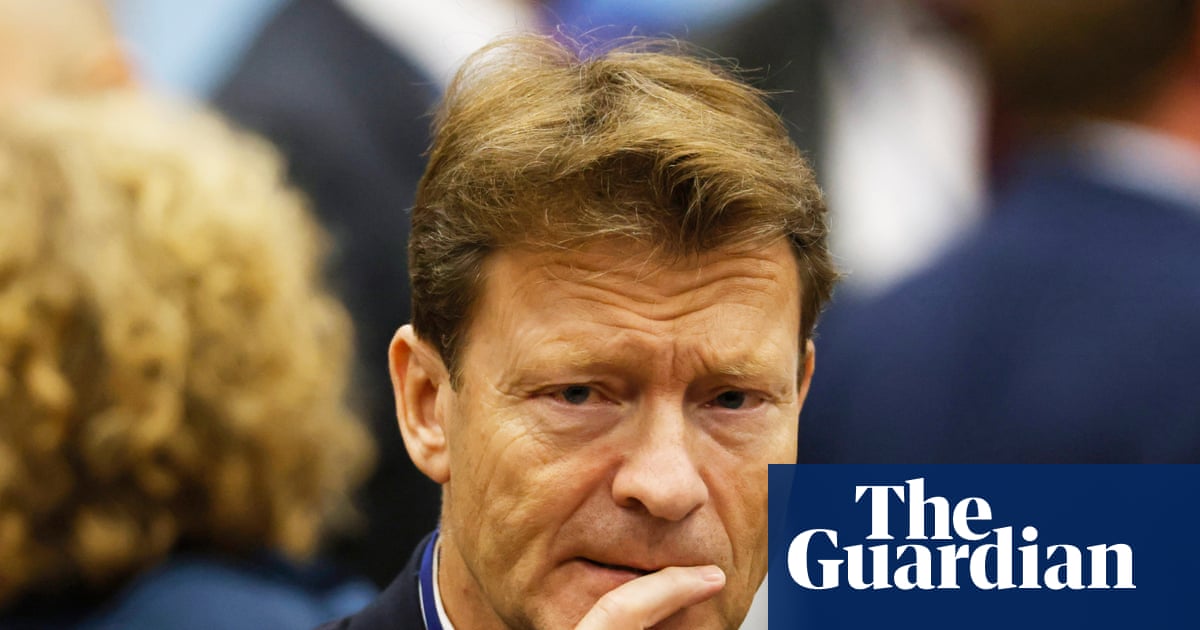He never seems to tire of deriding “net stupid zero”, but Reform UK’s deputy leader, Richard Tice, has a 15-year business record of support for sustainability and green energy initiatives.
The Reform party has made opposition to green energy and net zero part of its policy platform. Its founder, Nigel Farage, has called net zero policies a “lunacy”; the party has called to lift the ban on fracking for fossil gas; and one of the first Reform-led councils, Kent, rescinded last month its declaration of a climate emergency.
However, companies led by Tice since 2011 boasted of their commitments to saving energy, cutting CO2 emissions and environmental responsibility. One told investors it had introduced a “green charter” to “mitigate our impact on climate change” and later hired a “full-time sustainability manager” as part of “its focus on energy efficiency and sustainability”.
Another said it was “keen to play its part in reducing emissions for cleaner air” and said it had saved “hundreds of tonnes of CO2” by installing solar cells on the rooftops of its properties.
A glance at Tice’s account on X reveals contempt for warnings of climate breakdown and efforts to mitigate it. Last year he said: “We are not in climate emergency; nor is there a climate crisis.” In May he stated: “Solar farms are wrong at every level” and insisted they would “destroy food security, destroy jobs [and] destroy property values”.
He recently adopted the slogan “net stupid zero”, describing efforts to neutralise the UK’s fossil fuel emissions as “the most costly self-inflicted wound in modern British history”.
But Steff Wright, a sustainability entrepreneur and former commercial tenant of Tice, found that statements in the annual reports from CLS Holdings and Quidnet Reit, property companies led by Tice, contradicted his public position.
Wright said: “These reports reveal that Tice can clearly see the financial, social and environmental benefits of investing time, money and energy into sustainability focused initiatives.
“He is a businessperson, and if he has chosen to be a chief executive of at least two companies who have taken steps to reduce carbon emissions and implement energy-efficient innovations, it’s because there is a business case to do so.”
In 2010, the year Tice joined CLS Holdings as deputy chief executive, the company said it was committed to “a responsible and forward-looking approach to environmental issues” by encouraging, among other things, “the use of alternative energy supplies”.
The following year, when Tice was promoted to chief executive, the company implemented the green charter and hired a sustainability manager. In 2012, CLS celebrated completing its “zero net emissions” building, adding: “The board acknowledges the group’s impact on society and the environment and … seeks to either both minimise and mitigate them, or to harness them in order to affect positive change.”
In the company’s 2013 report, climate change was identified as a “sustainability risk”, requiring “board responsibility”, “dedicated specialist personnel” and “increased due diligence”. The company’s efforts were rewarded in 2014, when it was able to tell shareholders it had exceeded its CO2 emissions reduction targets.
Tice launched Quidnet Reit, a property investment company, the following year. When it published its first full accounts, covering 2021, Tice was also chair of Reform UK, and already setting out his stall against “net stupid”. But for his company, fossil fuel emissions remained a priority.
skip past newsletter promotion
The planet’s most important stories. Get all the week’s environment news – the good, the bad and the essential
Privacy Notice: Newsletters may contain information about charities, online ads, and content funded by outside parties. If you do not have an account, we will create a guest account for you on theguardian.com to send you this newsletter. You can complete full registration at any time. For more information about how we use your data see our Privacy Policy. We use Google reCaptcha to protect our website and the Google Privacy Policy and Terms of Service apply.
after newsletter promotion
The 2021 report stated: “The company is keen to play its part in reducing emissions for cleaner air,” and detailed investments in solar power which “importantly … will reduce CO2 emissions by some 70 tonnes per annum”.
Quidnet’s emissions reduction efforts continued into 2022 and 2023, with the company stating both years that its solar investments were “saving hundreds of tonnes of CO2” a year. However, after a Guardian report last year covered some of Quidnet’s environmental commitments, no mention was made of them in last year’s report.
Wright said: “Solar initiatives and other energy efficiency schemes have benefited Tice’s property companies whilst he was in charge, but now … there is a political advantage to gain Tice is all too happy to label these schemes as ‘perilous’ for investors.”
Tice said critics were “in danger of confusing apples with pears”, insisting the comparisons revealed no contradiction. “I have never said don’t reduce emissions, be they CO2 or other, and where sensible use technology to do so efficiently.”
“Solar panels on roofs, selling electricity to tenant[s] underneath are [an] excellent double use of [a] roof and involve no subsidies. Solar farms on farmland is insane, involves large public subsidies and often include dangerous [battery energy storage] systems.”
Tice said that when he ran CLS, net zero was not a legal requirement. “My issue has always been the multibillion subsidies, fact that renewables have driven electricity prices higher, made British industries uncompetitive and destroyed hundreds thousand jobs,.
“Also in annual reports, because of [the] madness of ESG, so banks and shareholder became obsessed with emissions so companies felt pressured to report on all this. ESG is also mad, stands for Extremely Stupid Garbage, and is now rapidly sensibly being abandoned by many companies and banks.
“So my position has been clear and logical and never involved subsidies. Big difference.”

